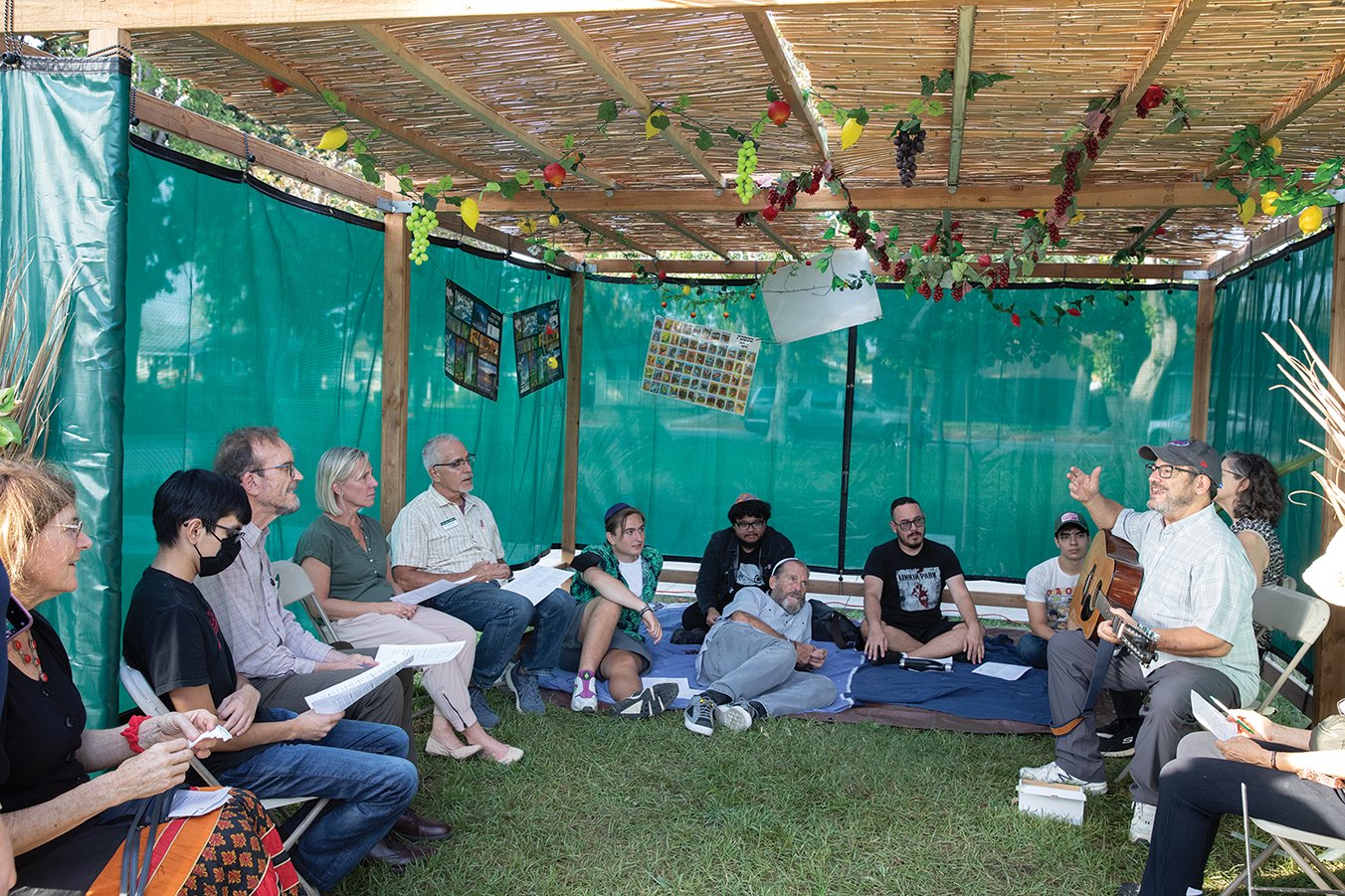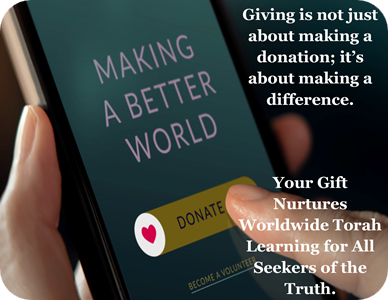


Festivals of the Righteous Non-Jew
More on Sukkot for Noahides
Introduction
As we saw in the previous lesson, Sukkot is a holiday of major importance for both Jews and Noahides. This lesson is concerned with the greater question of acknowledging this importance. How can Noahides connect with the holiday of sukkot in our times?
Observances of Sukkot
The Torah commands a number of observances to Israel on sukkot, most of which are impossible to fulfill in our times. Without the temple, we cannot perform the water libations, offerings, or many other mitzvos. Today, there are only two that remain:
Also in the 15th day of the seventh month, when you have gathered in the fruit of the land, you shall keep a feast to the Lord seven days; on the first day shall be a Sabbath, and on the eighth day shall be a Sabbath. And you shall take on the first day the boughs of goodly trees, branches of palm trees, and the boughs of thick trees, and willows of the brook; and you shall rejoice before the Lord your God seven days. And you shall keep it a feast to the Lord seven days in the year. It shall be a statute forever in your generations; you shall celebrate it in the seventh month. You shall dwell in booths seven days; all who are Israelites born shall dwell in booths. That your generations may know that I made the people of Israel to dwell in booths, when I brought them out of the land of Egypt; I am the Lord your God.1
However, these two mitzvos, of taking the four species and dwelling in sukkot, were commanded only to Israel. This fact creates a problem of chiddushei dat for Noahides. Additionally, there are no minhagim (customs) for Sukkot that translate from Jewish to Noahide practice. In what way, then, can Noahides form a meaningful connection with the holiday of Sukkot?
Sukkot of Future Times
Though it is clear that Noahides do not observe the Jewish mitzvos of Sukkot, this is apparently only in our times. The prophet Zechariah tells us:
And it shall come to pass, that every one that is left of all the nations that came against Jerusalem shall go up from year to year to worship the King, the Lord of hosts, and to keep the feast of tabernacles. And it shall be that whoever of the families of the earth that does not go up to Jerusalem to worship the King, the Lord of hosts, upon them there shall be no rain.2
We see, therefore, that the nations of the world who survive the war of Gog and Magog will keep sukkot in the future, and that it will continue to be the time for judgment of water.
On a tangential note – there is a fascinating aggadic (non-legal or ethical) understanding of the non-Jew’s future observance of sukkot brought in Avodah Zarah 3b. We will discuss it in the live class.
Sukkot Today
In much the same way that the Jews would offer sacrifices on behalf of the non-Jews of the world, taking a proactive role on their behalf, it appears that the Jewish community should take a more proactive role even now in making sukkot relatable to non-Jews.
If there is any holiday in which Noahides and Jews should come together, it is on Sukkot.
Ideally, sukkot is the time that Jews should share communal meals with Noahides in the Sukkah and that both should rejoice in their common goal: a Torah-based redemption of mankind.
However, this ideal is not as easy as it sounds. The tragic 2000-year history of Jews and Non-Jews has created a situation in which the Torah-observant community is insular and uninterested in engaging with non-Jews. It is difficult for 20 years of Noahide interest in Torah to sway a mindset established by 2000 years of unimaginable oppression, brutality, and bloodshed. The idea of non-Jews having any positive interest in Torah is still something novel and strange to most of the Jewish world. Does the Torah-observant Jewish world trust Noahides? As a whole, the answer is “no.”
This “No” must be understood in the context of history. See, for example, Codex Judaica by Rabbi Matis Kantor. This is an excellent year-by-year overview of Jewish history from the creation of the world until the modern era. Starting in the early middle ages, you will see that hardly a year passes without mass executions, state persecution, burnings, exile – it is a non-stop record of sorrows. Each year, tens of thousands of Jews were brutally exterminated and no one – absolutely no one – batted an eye. The world was indifferent to the Jewish oppression and suffering. As a result, the Jews had to develop a mentality that placed their own survival above all else. This mentality is still needed and still governs the Jewish attitude toward outreach. Remember, the holocaust, the last major destruction of Jewry, was only 69 years ago. For the past several decades, the Jewish world has been struggling to rebuild a basis upon which their future survival can be guaranteed. All efforts are being devoted to stopping assimilation, establishing Jewish schools, encouraging mitzvos observance, and much more. In short: the Torah world today is still concerned and fighting for its own survival. The recent advent of Noahism needs a lot of time before it can gain the necessary attention, trust, and resources trust of the mainstream Jewish world.3
The sign that Noahism has “arrived,” is when every Noahide knows that they will be invited to a Jew’s sukkah on Sukkot and every Jew knows a Noahide to invite.
Prayers
As with all of the holidays, the prayers are the most important part – and on Sukkot there is a LOT for which to pray.
Before getting into the prayers of Sukkot, lets do a quick review of the liturgical calendar so far:
**1st of Elul – We began introspection and intense self-examination inpreparation for the Day of Judgment, Rosh HaShanah.
**26th of Elul – Noahides began saying Selichos, penitential prayers.
**1st of Tishrei, Rosh HaShanah – Prayer and joyful evening meal withSimanim. Day prayers followed by a meal. Prayers of this day are amixture of Joy and prayers for forgiveness.
**From the 2nd of Tishrei through the seventh day of sukkos, it isappropriate to continue reciting selichos. However, these selichos are inpreparation for the atonement period of Sukkot. We have providedselichos for the four days prior to Rosh HaShanah, yet it is appropriate forselichos to continur through the final day of Sukkot.
**15th of Tishrei – First day of Sukkot. Prayers for this period include festivemeals with friends. It is appropriate for Jews to have Noahides as guestsand to share meals in the Sukkah. The day time prayers of each of theSeven days include mention of the offerings of that day.
**21st of Tishrei – The final day of Sukkot. On this day, the prayer for rain issaid in the congregation in the morning. The day service includes prayersfor atonement. The day should be one of celebration and confidence thatGod will hear everyone’s prayer and hearken to it.
Shemini Atzeret / Simchas Torah
The holiday of Shemini Atzeret, which falls out on the eight day after the start of Sukkot, is not part of the Sukkot holiday. Instead, it is an independent holiday.4 The Torah discusses Shemini Atzeret in two places:
Seven days you shall bring an offering made by fire unto the Lord; the eighth day shall be a holy convocation to you; and you shall bring an offering made by fire unto the Lord; it is a day of solemn assembly; you shall do no manner of servile work.5
And,
On the eighth day ye shall have a solemn assembly: ye shall do no manner of servile work.6
Curiously, though, the Torah gives no reason for this holiday. Even the name of the holiday, Shemini Atzeres, yields little insight. Shemini means “the eighth,” while the word “atzeres,” connotes “ingathering,” and “assembly,” as well as “holding back,” and “tarrying.”
The sages explain the meaning of Shemini Atzeres using a parable: A king throws a banquet for several days, inviting guests from all over his country. This includes his sons, who travel to be with him. At the end of the celebration, all the guests leave. However, the king asks his sons to linger, to spend one more day with him.
Similarly, the holiday of Sukkot is a seven day banquet for all the nations of the world. However, once it concludes, God asks Israel to tarry for one more day. This holiday’s only purpose is to make a distinction between Israel and the non-Jewish nations. As such, it is inappropriate for Noahides to observe it.
What about Simchas Torah, the holiday that coincides with Shemini Atzeres? Simchas Torah is the celebration marking the renewal of the weekly cycle of Torah readings. However, there is no source for this holiday. It is not mentioned in the Torah, Talmud, or any of the foundational literature. Where does it come from?
It appears that Simchas Torah began in the 10th century. However, it was not until several hundred years later that it became universally observed in the Jewish world. Most of the customs of the holiday developed in Europe during the 14th and 15th centuries.
Is it relevant to Noahides? Possibly.
The celebration of Simchas Torah is a custom which has developed around another custom. The annual Torah cycle is also a custom developed primarily in the diaspora. In fact, it was only recently that an annual cycle has become almost universal.
Sources
1 Lev. 23:39-43.
2 Zech. 14:16-17.
3 Unfortunately, there are many who have lost support or become persona-non-grata in the Jewish world. To maintain support and keep an audience, they have turned to teaching Torah to Noahides, Christians, and other non-Jewish groups. Unfortunately, the fact that a Rabbi is teaching non-Jews is viewed in the Jewish world as a sign that Rabbi has lost legitimacy in his own community. This fact means that Noahides must be extremely cautious when deciding who to learn from and whose advice to accept.
4 See Sukkot 48a.
5 Lev. 23:36.
6 Num. 29:35.



